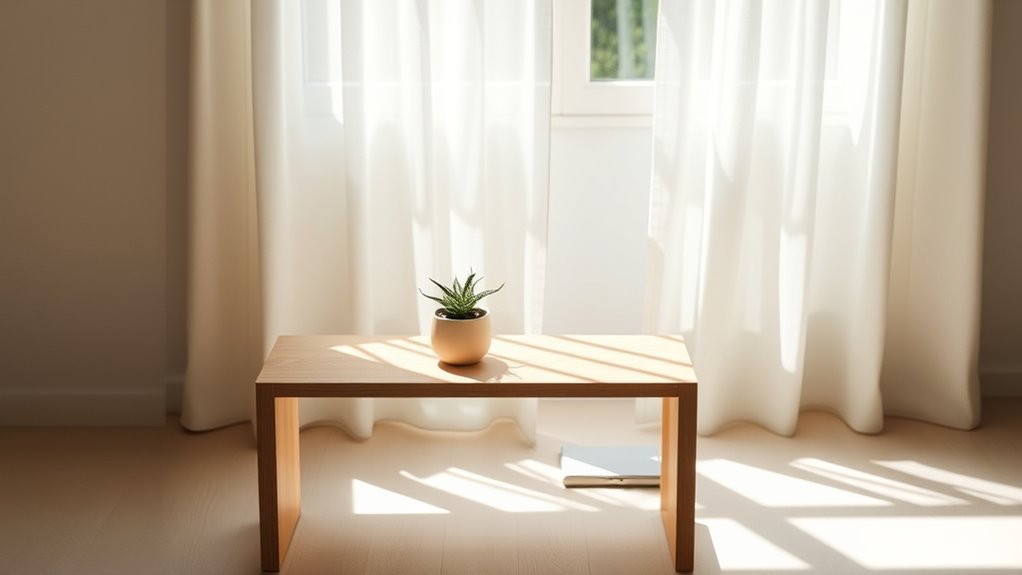By embracing minimalism and living intentionally, you can markedly reduce waste and support sustainability. This involves making mindful choices like carrying reusable bags, buying fewer items, and investing in quality over quantity. Ethical fashion and thoughtful consumption help cut down on the environmental impact of fast fashion. Small daily habits can make a big difference for the planet. If you want to discover more ways to align your lifestyle with eco-friendly values, keep exploring these ideas.
Key Takeaways
- Embracing minimalism encourages intentional consumption, reducing unnecessary purchases and minimizing waste generation.
- Using reusable items like bags and bottles supports waste reduction and decreases reliance on disposable plastics.
- Prioritizing durable, repairable products extends their lifespan, decreasing textile and product waste.
- Choosing ethical, eco-friendly brands promotes sustainable practices and lessens environmental impact.
- Simplifying life fosters awareness of consumption habits, promoting environmentally responsible decisions and waste minimization.

Have you ever wondered how simplifying your life can benefit the planet? Embracing minimalism isn’t just about decluttering your space; it’s about making intentional choices that reduce waste and support sustainability. One of the most impactful ways to do this is by adopting a zero waste mindset. When you aim to produce as little trash as possible, you start to rethink your consumption habits. You might carry reusable bags, bottles, and containers, avoiding disposable plastics. This small change adds up over time, decreasing the amount of plastic that ends up in landfills and oceans. Zero waste living encourages you to buy fewer items overall, especially those with excessive packaging. Instead, you seek out products that are durable, repairable, and made to last, which naturally aligns with minimalist principles of owning less.
Another powerful aspect of minimalist sustainability is choosing ethical fashion. Fast fashion encourages mass production, rapid turnover, and wastefulness, which directly conflicts with the idea of reducing your environmental footprint. Ethical fashion promotes purchasing clothing from brands that prioritize fair labor practices, sustainable materials, and eco-friendly production methods. When you opt for quality over quantity, you’re less likely to throw away clothing after a few wears. This not only reduces textile waste but also supports companies committed to environmental responsibility. Ethical fashion often involves investing in timeless pieces that can be styled in multiple ways, further decreasing the need for constant shopping. By integrating these principles into your wardrobe, you reduce waste and contribute to a more sustainable fashion industry.
Living minimally means you become more conscious of every purchase. It’s about asking yourself if you genuinely need an item or if it’s driven by impulse. This intentional approach discourages overconsumption, which is a major contributor to waste. You start to appreciate the value of well-made, sustainable products that last longer, instead of constantly chasing the latest trends. As a result, your lifestyle becomes more aligned with eco-friendly values, and you’re less likely to contribute to environmental degradation. This shift isn’t about deprivation but about making smarter, more meaningful choices that benefit both you and the planet. By reducing waste and supporting ethical practices, your minimalist lifestyle becomes a powerful tool in creating a more sustainable world.
Frequently Asked Questions
How Can Minimalism Improve Mental Health?
Minimalism can considerably improve your mental health by reducing clutter and creating a calm environment. As you embrace intentional living, you’ll find it easier to practice mindfulness, which helps you stay present and manage stress. Simplifying your possessions also boosts emotional resilience, making it easier to handle life’s challenges. By focusing on what truly matters, you foster a sense of clarity and peace that enhances your overall well-being.
What Are Eco-Friendly Alternatives to Common Household Items?
Sure, replacing plastic wrap with biodegradable packaging is a no-brainer—your food stays fresh, and the planet thanks you. Reusable kitchenware like metal straws, glass containers, and bamboo utensils make single-use items seem downright lazy. Ironically, these eco-friendly swaps might take a little more effort, but they cut down waste and help you live intentionally. Plus, you’ll look pretty cool at the next dinner party with your stylish, sustainable gear.
How Do I Start Reducing Waste in Daily Life?
To start reducing waste in your daily life, focus on improving your recycling habits and adopting composting techniques. Begin by sorting recyclables properly and creating a compost bin for organic waste like food scraps and yard waste. Use reusable bags, bottles, and containers to cut down on single-use items. Small, consistent changes make a big difference over time, helping you live more intentionally and sustainably.
Can Minimalism Save Money Long-Term?
Yes, minimalism can be a financial lighthouse guiding you to long-term savings. By trimming unnecessary expenses, you free up funds for smarter budget planning and accelerate your journey toward financial independence. Less clutter means fewer impulsive purchases, transforming your money into a steady stream rather than a flood. Over time, this intentional living creates a sturdy financial foundation, turning frugal habits into a pathway to lasting security and peace of mind.
What Are the Challenges of Maintaining a Minimalist Lifestyle?
You might find maintaining a minimalist lifestyle challenging due to clutter management and habit formation. It takes consistent effort to keep your space free of unnecessary items, which can be tempting to accumulate. Developing new habits, like regular decluttering and mindful purchasing, is essential but takes time. Staying committed requires discipline and patience, especially when faced with emotional attachments or societal pressures to buy more.
Conclusion
By embracing minimalism and sustainability, you become the gardener tending a delicate ecosystem, where each intentional choice nurtures a healthier planet. Your mindful living acts as a gentle ripple, transforming waste into wisdom and excess into elegance. When you simplify, you craft a symphony of purpose, harmonizing your life with the Earth’s natural rhythm. Ultimately, your conscious actions don’t just reduce waste—they weave a tapestry of hope, proving that small, deliberate steps can shape a brighter, greener future.








